APRIL 14-15
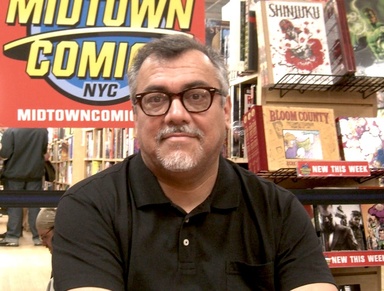
Gilbert “Beto” Hernandez is the co-creator of Love & Rockets, which has featured his groundbreaking stories set in Palomar, an ever evolving fictional small Central American town led by the matriarch Luba, and including a large cast of memorable characters. He has also created a number of major works set outside of the world of Palomar, including the graphic novels Sloth (2006), Julio’s Day (2013), and Marble Season (2013), among many others.
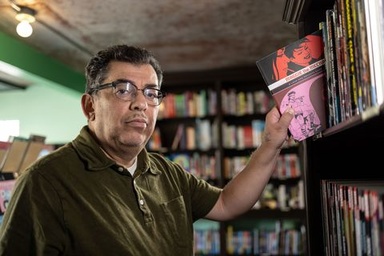
Jaime Hernandez is recognized as one of the most influential comics creators in the world. In 1981, with his brothers Gilbert and Mario, he created the ongoing comics magazine Love & Rockets for Fantagraphics Books, where he portrayed LA’s punk scene through the adventures of “Locas” Maggie and Hopey, two queer Latinx women, who remain among the most beloved and iconic characters of alternative comics.
Together, Jaime and Gilbert have won virtually every major accolade in the comics world, including the Ignatz, Harvey and Eisner awards. They are currently celebrating 40 years of Love & Rockets, and have been the subjects of a recent documentary film and a New York Times feature article, among other acknowledgements of their comics masterpiece.
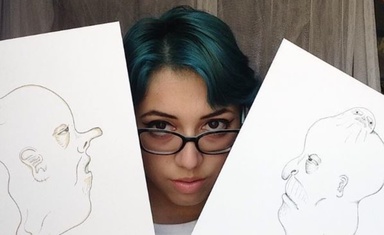
Natalia Hernandez is a cartoonist inspired by fantastic art. She sold her first mini-comic when she was 8 years old at SDCC. Then she did a backup story for DC’s Shade the Changing Girl #1 and made an appearance in the Hey Amateur anthology for Black Crown.
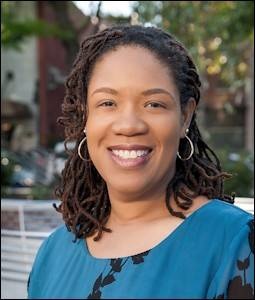
Qiana Whitted is Professor of English and African American Studies at the University of South Carolina. A graduate of Hampton University with a PhD from Yale University, her research and teaching focus on Black literary and cultural studies, and American comics and graphic novels. She is the author of the Eisner Award-winning book, EC Comics: Race, Shock, and Social Protest and co-editor of the collection on Comics and the U.S. South. Along with numerous published articles, book chapters, and online writings that explore race, genre, and history in comics, she has written the introductory essay for the recent volume of Black Panther comics for Marvel’s new Penguin Classics Collection. Her forthcoming edited collection, Desegregating Comics: Debating Blackness in the Golden Age of American Comics, will be published in May 2023. She is also the Editor of Inks: The Journal of the Comics Studies Society and Chair of the International Comic Arts Forum.
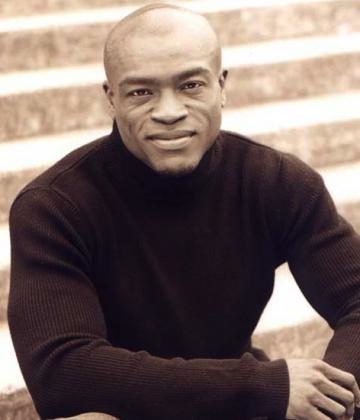
Darieck Scott is a professor of African American Studies at the University of California, Berkeley. Scott is the author of Keeping It Unreal: Black Queer Fantasy and Superhero Comics (NYU Press, 2022). His book Extravagant Abjection: Blackness, Power, and Sexuality in the African American Literary Imagination (NYU Press 2010), was the winner of the 2011 Alan Bray Memorial Prize for Queer Studies of the Modern Language Association. Scott is also the author of the novels Hex (2007) and Traitor to the Race (1995), and the editor of Best Black Gay Erotica (2004). His fiction has appeared in the anthologies Freedom in This Village (2005), Black Like Us (2002), Giant Steps (2000), Shade (1996) and Ancestral House (1995), as well as in the erotica collections Flesh and the Word 4 (1997) and Inside Him (2006). A fantasy-genre novel, The Dream-Slaves, is forthcoming from Brainstorm Books/Punctum. He has published essays in Callaloo, GLQ, The Americas Review, and American Literary History, and is co-editor with Ramzi Fawaz of the American Literature special issue, “Queer About Comics,” winner of the 2018 Best Special Issue from the Council of Editors of Learned Journals.
DRAWING PANELS AND CROSSING BORDERS (February 9-11)
Joe Sacco
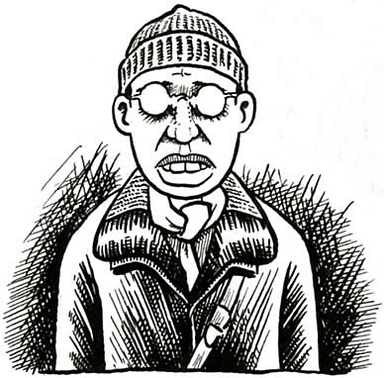
Joe Sacco is a Maltese-American comic artist known for Palestine (1993), Safe Area Gorazde (2000), Footnotes in Gaza (2009), and Paying the Land (2020) among many other award-winning works. A journalist by trade, he uses his drawing and narrative skills to provide a mosaic of testimonies that problematize mainstream narratives on genocide, political violence, migration and crimes against humanity in the Middle East, the Balkans, Southeast Asia and North America. He has won the American Book Award (1996), the Eisner Award (2001), the Eagle award and the Time magazine “Best Comic” award (2000) among many other nominations and recognitions.
MariNaomi
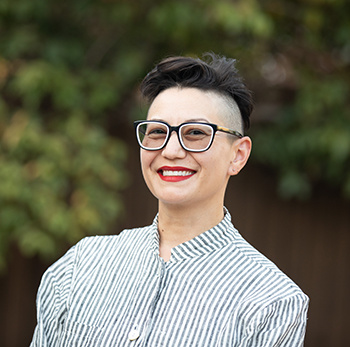
MariNaomi (they/them) is the award-winning author and illustrator of Kiss & Tell: A Romantic Resume, Ages 0 to 22 (Harper Perennial, 2011), Dragon’s Breath and Other True Stories (2dcloud/Uncivilized Books, 2014), Turning Japanese (2dcloud, 2016), I Thought YOU Hated ME (Retrofit Comics, 2016), the Life on Earth trilogy (Graphic Universe, 2018-2020), Dirty Produce (Workman Publishing, 2021), and the upcoming collage-comics memoir I Thought You Loved Me (Fieldmouse Press, 2023). Their work has appeared in over eighty print publications and has been featured on websites such as The New Yorker’s Daily Shouts, The Washington Post, LA Times, The Rumpus, LA Review of Books, Midnight Breakfast and BuzzFeed. Their comics have been translated into French (Devenir Japonaise, Editions IMHO, 2021) and Russian.
José Alaniz

José Alaniz, professor in the Department of Slavic Languages and Literatures and the Department of Cinema and Media Studies (adjunct) at the University of Washington, Seattle, has published three monographs, Komiks: Comic Art in Russia (University Press of Mississippi, 2010); Death, Disability and the Superhero: The Silver Age and Beyond (UPM, 2014); and Resurrection: Comics in Post-Soviet Russia (OSU Press, 2022). He has also co-edited two essay collections, Comics of the New Europe: Reflections and Intersections (with Martha Kuhlman, Leuven University Press, 2020) and Uncanny Bodies: Disability and Superhero Comics (with Scott T. Smith, Penn State University Press, 2019). He formerly chaired the Executive Committee of the International Comic Arts Forum (ICAF) and was a founding board member of the Comics Studies Society. In 2020 he published his first comics collection, The Phantom Zone and Other Stories (Amatl Comix). His current book projects include Comics of the Anthropocene: Graphic Narrative at the End of Nature. He lives blissfully with his wife and 25 animals in rural Washington state.
Candida Rifkind

Candida Rifkind is Professor in the Department of English at the University of Winnipeg, where she specializes in alternative comics and graphic narratives, Canadian popular and political writing, and feminist auto/biography theory. She is currently writing Graphic Refuge: Visuality and Mobility in Refugee Comics (forthcoming Wilfrid Laurier UP). She has co-edited several books and journal issues like volume 35.2 of a/b: Auto/Biography Studies on “Migration, Exile, and Diaspora in Graphic Life Narratives,” the scholarly collection Canadian Graphic: Picturing Life Narratives (Wilfrid Laurier UP, 2016), Documenting Trauma: Traumatic Pasts, Embodied Histories & Graphic Reportage in Comics (Palgrave 2020), and the online open access resource Indigenous Comics and Graphic Novels: An Annotated Bibliography (Jeunesse, 2019). She served on the Executive Board of the Comics Studies Society (2017-21) and serves on the Editorial Advisory Boards of the journals iNKS, Canadian Literature, and Studies in Canadian Literature, among others. In Fall 2019, she co-organized the first One Book UW program at the University of Winnipeg on the Indigenous comics anthology This Place: 150 Years Retold.
Jorge J. Santos Jr.
Jorge J. Santos is an award-winning scholar of comics and multiethnic literatures of the United States. He is associate professor at the College of the Holy Cross and his fields include Latina/o/x literature, Asian American literature, Multiethnic Literatures of the United States (MELUS), immigrant/migrant literature, ethnic studies, American cultural studies, composition (particularly English Language Learner pedagogy), and comic studies. His first book, Graphic Memories of the Civil Rights Movement: Reframing History with Comics (University of Texas Press, 2019), won the Charles Hatfield Book Prize from the Comic Studies Society (2019) and the CHOICE Outstanding Academic Titles (2019).
"DAYS OF FUTURE PASTS" PANELISTS (November 4-5)
Julian Chambliss
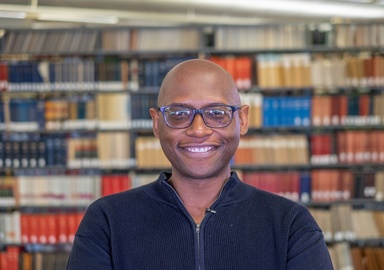
Julian C. Chambliss is a Professor of English and the Val Berryman Curator of History at the MSU Museum at Michigan State University. In addition, he is a co-director for the Department of English Digital Humanities and Literary Cognition Lab (DHLC), faculty lead for the Department of English Graphic Possibilities Research Workshop, and a core participant in the MSU College of Arts & Letters’ Consortium for Critical Diversity in a Digital Age Research (CEDAR). His research interests focus on race, culture, and power in real and imagined spaces. He is co-editor of Assembling the Marvel Cinematic Universe: Essays on the Social, Cultural, and Geopolitical Domain (2018) as well as co-editor and contributor for Ages of Heroes, Eras of Men: Superheroes and the American Experience (2013). His exhibition for the MSU Museum, Beyond the Black Panther: Vision of Afrofuturism in American Comics, explores Afrofuturist theme comics produced in the United States. His comics and digital humanities projects include The Graphic Possibilities OER and Critical Fanscape. His recent writing has appeared in Scholarly Editing, Genealogy, KULA: Knowledge Creation, Dissemination, and Preservation Studies, and The Conversation US.
Lara Saguisag
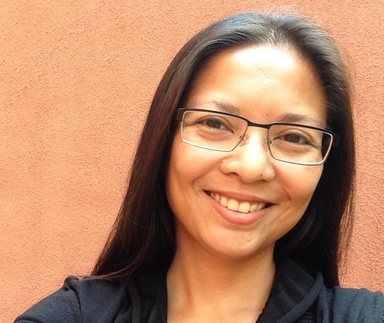
Lara Saguisag is Associate Professor and Georgiou Chair in Children’s Literature and Literacy at New York University. Her research, teaching, and community projects are informed by climate justice and energy justice movements. Through the Children’s Literature Association’s Climate Justice Interest Group, which Lara founded and currently convenes, she works with colleagues to promote climate justice-oriented research and teaching. With Marek Oziewicz, she co-founded Climate Lit, an open-access web resource for teaching climate change and climate justice through literature for young people. Lara’s other interests include comics and graphic novels, Philippine children’s literature, and transformative justice in education. Her monograph Incorrigibles and Innocents: Constructing Childhood and Citizenship in Progressive Era Comics (Rutgers UP, 2018) examines how the intertwined discourses of childhood, citizenship, and nationhood were expressed in and complicated by Progressive Era newspaper comics. It received several honors, including the Charles Hatfield Book Prize from the Comics Studies Society and an Eisner nomination for Best Academic/Scholarly Work. Lara is also the author of several children’s books, including Animal Games and Children of Two Seasons: Poems for Young People.
Rachel Williams

Rachel Williams, a native of Eastern North Carolina, holds a Ph.D. in Art Education and an M.F.A. in Studio Art from Florida State University. She was a Professor of Gender, Women’s and Sexuality Studies and Studio Art at the University of Iowa from 1999-2022. Currently, she is the dean of the Division of Liberal Arts at the UNC School of The Arts in North Carolina. Her work appears in Southern Cultures, Meridians, the Journal of Arts Management Law and Society, The Journal of Poetry Therapy, Feminist Studies, and Visual Arts Research. She is also the author of Teaching the Arts Behind Bars (Northeastern U. Press, 2003) Elegy for Mary Turner (Verso Press, 2021) and Run Home If You Don’t Want to Be Killed: The Detroit Uprising of 1943 (UNC Press/Duke Center for Documentary Studies, 2021).
"HOW DO WE LOOK?" PANELISTS (SEPTEMBER 9-10)
Frederick Luis Aldama

Frederick Luis Aldama, a.k.a. Professor Latinx, is the Jacob and Frances Sanger Mossiker Chair in the Humanities at the University of Texas, Austin, where he is also founder and director of the Latinx Pop Lab. He is an award-winning author, co-author, editor, and coeditor of over 48 books, including an Eisner Award for Latinx Superheroes in Mainstream Comics. He is editor and coeditor of 9 academic press book series, including Latinographix that publishes Latinx comics. He is the producer and co-creator with DG Cine of the first documentary on the history of Latinx superheroes as well as founder of the annual BIPOC POP in Austin. He is author of several children’s books, including The Adventures of Chupacabra Charlie (published in English and Spanish) and Con Papá / With Papá as well as co-creator of the animation short, Carlitos Chupacabra, currently on a worldwide film festival tour. In 2022 he was inducted into the Texas Institute of Letters and Ohio State University's Office of Diversity & Inclusion Hall of Fame.
Stacey Robinson
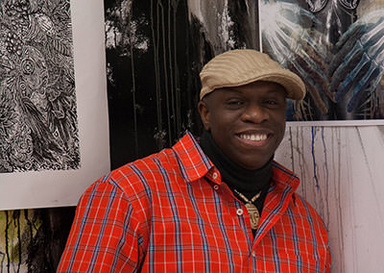
Stacey Robinson is Associate Professor of Graphic Design at the University of Illinois at Urbana-Champaign. He was a 2019-2020 Nasir Jones Hip-Hop Fellow at Harvard University’s Hutchins Center for African & African American Research who completed his Masters of Fine Art at the University at Buffalo (2015). For the last several years he has traveled internationally discussing the complexities of decolonized future spaces. As one half of the collaborative team “Black Kirby” with artist John Jennings, Robinson creates graphic novels, gallery exhibitions, lectures, and workshops that use world-building strategies to imagine new worlds inspired by Design, Hip-Hop, the Arts and Sciences, and diasporic African belief systems. His latest graphic novels are I Am Alfonso Jones written by Tony Medina (Lee & Low Books, 2017), and Across the Tracks: Remembering Greenwood, Black Wall Street, and the Tulsa Race Massacre, written by Alverne Ball (Abrams/Megascope, 2021). Recent exhibitions include Ascension of Black Stillness (CEPA Gallery in Buffalo, NY) and The Black Angel of History (Carnegie Hall’s Afrofuturism Festival, 2022).
Bishakh Som

Bishakh Som is a Brooklyn-based multi-media artist with a background and ongoing interests in architecture, whose comics includes Apsara Engine (The Feminist Press, 2020), which won the Los Angeles Times Book Prize for Best Graphic Novel, and the memoir Spellbound (Street Noise Books, 2020). Her comics have also appeared in The New Yorker, The Boston Review, and many other journals and collections, including the award-winning We’re Still Here (2018), the first all-trans comics anthology; her artwork has also been exhibited in numerous solo and group shows, including at the Society of Illustrators in New York City.
Rebecca Wanzo
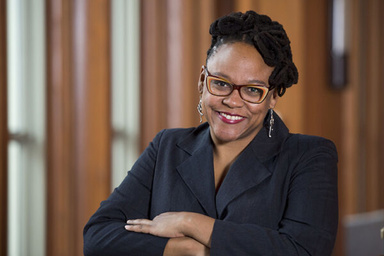
Rebecca Wanzo is Chair and Professor of Women, Gender and Sexuality Studies, and Affiliate Professor of American Culture Studies at Washington University in St. Louis. She is the author of The Suffering Will Not Be Televised: African American Women and Sentimental Political Storytelling (2009), and has published widely on comics, mass media, and African American culture in both academic and popular venues. Her recent book The Content of Our Caricature: African American Comic Art and Political Belonging (2020) received the Katherine Singer Kovacs Book Prize from the Society for Cinema and Media Studies, the Charles Hatfield Book Prize from the Comics Studies Society, and the Best Scholarly/Academic Work from the Will Eisner Comic Industry Awards.